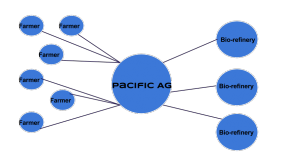The Biomass Network
Source: http://www.biofuelsdigest.com/bdigest/2015/06/14/an-amazon-com-for-bioenergy-supply-chain-logistics/
Sustainability is playing a major role in shaping the global economy. Companies of all origin are trying to tackle the challenges of tomorrow with solutions that are both beneficial to the environment and bottom line. The bio-economy is a growing sector on the US economy and can be characterized by companies that are taking advantage of agriculture biomass or feedstocks. Biomass can be defined in many ways but for the purpose of this discussion it will be defined as the bio waste left behind after a harvest. This type of harvest by-product can also be known as crop residue because it is the leftover crop. For example, during a wheat harvest, grain is collected for food and straw is left behind. In this case, straw is the crop residue.
Crop residue still has huge potential in its untapped energy in the form of cellulosic sugars. Up until now, companies wanting to take advantage of agricultural crop residue, by building a bio-refinery to create energy, would have no secure way of developing a supply chain. This means that if I wanted to use 100,000 tons of crop residue per year that I would struggle to obtain an amount of that size that is consistent and reliable. The issue arises from a weak network of farmers and biomass industries.
In order to develop a supply chain that could supply 100,000 tons of residue, it would take dozens of small independent farmers. The logistics of harvest, marketing, and shipping would be nearly impossible because there is no strong ties between the agriculture market and the energy market. In some sense the two markets act as two separate networks with no significant connection to each other.
Such a challenge only leads to the entrance of Pacific Ag, a nationally growing company that acts as a strong connection between both small farmers in the agriculture industry and bio-energy sector. The secret is the company’s ability to building a dedicated supply chain. A supply chain by definition is a network of organizations that connect via strong ties to fulfill orders on the part of the end consumer. Pacific Ag has the ability to connect with hundreds of farmers nationally and supply biomass to dozens of large energy operations. The business model is not only profitable but leading the charge towards a more sustainable future.

